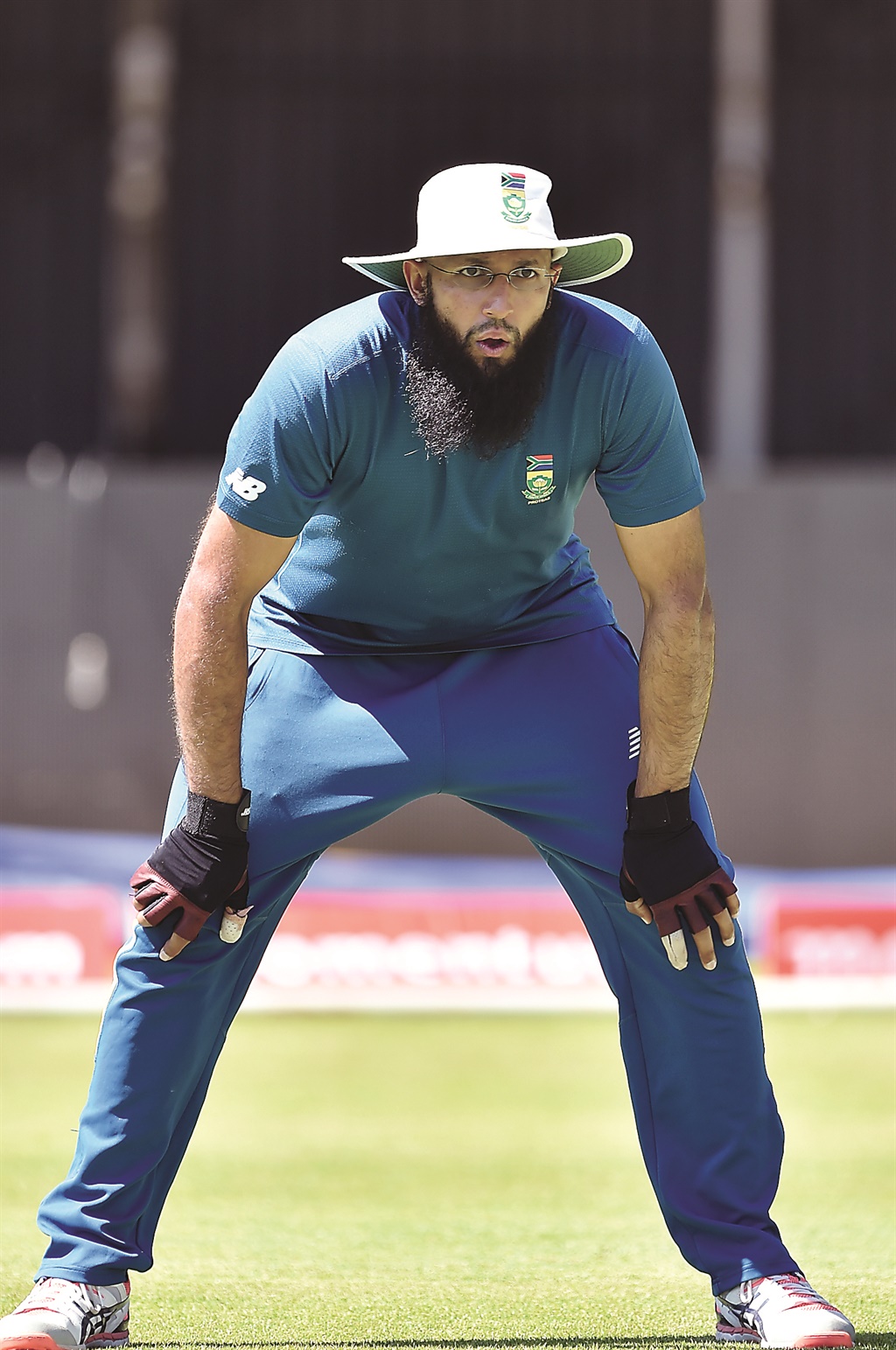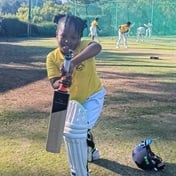
Hashim Amla’s resignation as Proteas test captain came as a shock to many, but the 32-year-old tells Hanlie Retief it was the best decision
It’s two days since the Centurion test and Hashim Amla has just got home. The Amla home in Durban is bustling with children and homecoming.
The Protea team’s Mr Manners apologises for his two-year-old daughter screaming blue murder in the background – she wants her father’s full attention.
“Give me a second.” He leaves to quieten her, which starts her crying even louder, and you hear a door closing quietly.
“Now we can talk,” Hash sighs with relief. Yes, it’s nice to be back home, he says. “The first thing I always do is have a cup of tea with my father and mother.”
His father, Mahomed, has been a general practitioner in Tongaat for years. It’s with their cousins that Hashim and his older brother, Ahmed (a former Dolphins batsman), learnt how to bat and bowl. Ahmed, four years older, once joked in an interview that he taught his brother nothing about cricket – he just bullied him.
Hash thinks back a long way, to hot afternoons of mini cricket in the park, and his first hard-ball match that changed him forever.
“I was nine or so and nervous about the hard ball. But I got 18 runs, and a few were boundaries. Boy, I was sooo very pleased – what can be better than a boundary?”
At 32, it is still exactly the same.
“But of course! The buzz remains. What an honour to play for your country for 10 years. One thing about this team: we know it’s a privilege to play for the Proteas, not a right. Nobody thinks his place is automatic.”
Not even Faf du Plessis?
Yes, he laughs. “Nobody.”
Annus horribilis. That’s how Hashim Amla’s 2015 has been described.
Under his captaincy, the Proteas won only four of 14 tests (six ended in a draw) and, in India, they lost their first away test series since 2006. His captaincy also left him in his own batting wilderness. In eight consecutive internationals, he scored fewer than 10 runs seven times.
And then, in the middle of the test series against England, came Amla’s shocking news: He was resigning as captain.
“I was simply not good enough.”
People were upset about his timing. He should have seen the series through, it was felt.
But Hash disagrees. Politely. “It would have been even worse if I had waited for things to slip even further. And without the pressure, I could help my team with my batting.”
And he did. Reborn, cricket writers said, and his batting now is too. In the Centurion test he scored his 25th test century in the first innings and nearly the 26th in the second.
“Yes, I am very grateful. I have had a difficult summer.”
For South Africans – used to Protea captains with chirpy, gruffer personalities, like Hansie Cronje and Graeme Smith – the quiet, reserved, soft-spoken captain on the field was as unusual as curry with boerewors.
It was said Amla was not speaking up enough on the field; there was something wrong in the Proteas’ camp; the captain and the team management weren’t leading the young players in a period of transition.
“Of course I tried to get the most out of the guys. I was straight ... strict too. But perhaps someone else’s strict is stricter than my strict,” he says lightly.
“When I took over as captain, there was a group of senior players with a lot of experience. Now there are a lot of young players, and I think a different captain’s style is likely to get the best out of them.”
It’s said there was political pressure on Amla – who had not even wanted to be captain at provincial level – to accept the captaincy.
“Absolutely not. Oh, I don’t know who started that kind of rumour. The players asked me to throw my name into the hat. So it’s the players, no one else.” He laughs cheerfully.
With AB de Villiers’ three ducks in a row since he took over leading the Proteas, there is talk of the curse of captaincy.
“No,” Hash says defensively. “I’m terribly sorry for AB. He’s the best player in the world, but even he is not always Superman. When he became captain of the one-day team, his batting moved to a higher gear. As test captain, he will definitely achieve lots of special things.”
He and AB have been playing together for 10 years. They’re close. “Before I resigned as captain, I discussed it with him. We exchange ideas and plans. You know, you spend much more time with your team-mates than with your family.”
There is no problem with the Proteas’ team spirit, he maintains. “Young players would certainly not have been able to perform like they did in a poor environment.”
Name Temba Bavuma and Kagiso Rabada, and he’s clearly excited. “New energy. What a young team we have: not five, but six debutants in a month.” (Although one of those debutants, Stephen Cook, was 33 years old.)
Amla has talked about how much pressure there is on black players when they start playing for South Africa.
Yes, he repeats, everyone wonders whether they will cope.
“Unfortunately, you can’t change the way certain people think. I know how that weight feels on your shoulders. I’ve been there.”
Criticism is something Amla always takes on the chin. But Ashwell Prince’s criticism of De Villiers (that AB has a “negative attitude”) gets a “whoa” from him, and you hear emotion in his voice for the first time. That’s not how he knows AB; AB is “one of the most positive players” he knows. He was quoted out of context.
And Smith, who was so critical of the Proteas’ management team?
No comment. Only: “We have been trying to find a batting coach for a long time, but those we approached said no.”
Like Smith himself?
He doesn’t reply. Only: “Every time we are criticised about it, we think: but we are trying. There is now finally possibly someone coming on board.”
Rock solid, Jacques Kallis called his old batting partner Amla on ESPNcricinfo: “Good head, total concentration, knows his limitations and his game plan and carries it out.”
Hash’s slightly unconventional batting technique initially provoked criticism, and he was even almost left out of the team.
It was a century against New Zealand that saved his career in 2007, he told a sports writer. He was given a life with his score on just two runs, and he ended the innings with an unbeaten 176. He never looked back and became a world star.
And how do you feel when Stuart Broad comes charging at you at full speed?
“Feel? No, there’s no emotion. You are completely in the moment. It’s just you and the cricket ball, no matter who’s bowling. You don’t know what the outcome will be – a six, a single, a ball that you let go by.
“You don’t think about it, because then you become involved and your focus shifts.
“Sooo ... you bat that ball entirely on its merit. As best you can – otherwise you’re on your way back to the pavilion.”
He grins.
It’s a bit like life?
“Well, I don’t want to be philosophical,” he says, but then is. “It’s to be in the moment, not to look too far ahead; not to worry about what happened in the past. Narrow your focus to every single ball. That’s the theory. The practice is much more difficult and sometimes you get away with mistakes; other times not.”
The Iceman. The reason for this nickname is simple: the man hardly sweats. When he scored his triple century at The Oval in London in 2012, he did not change his gloves once during his marathon innings.
“Well, I did once, many years ago in India, change my gloves, but it was a very hot day ... very hot.” He tries to dispel the legend, but only reinforces it.
Is there anything that can upset the mighty Hash?
“Yes, of course, but the more experience, the less likely that something will catch you unawares. You can’t buy experience at the supermarket.”
He has two heroes in cricket: Brian Lara and Steve Waugh. “Brian played shots we were told never to play. Unorthodox, but one of the most effective and spectacular batsmen.”
And Waugh: “Quiet but determined, who could dig deep in difficult situations.”
One of the few “highlights” of the recent series against England was the Battle of the Beards – the pavilion jokes between “[Moeen] Ali’s army” and “Amla’s army”.
“Yes, we joke about this a lot; at least it provides a little humour.”
He started growing his beard at 20, and has never shaved, because it’s wadjib (compulsory) for a Muslim. He wears it as long as a hand’s breadth, which is also wadjib.
In 2008, after South Africa’s first series win in England in 40 years, the story goes that the team went partying in Birmingham that night. Hash also celebrated – with a flavoured milk.
Ramadan is the best month of the year for him.
“Abstinence teaches you to appreciate your privileges. You become very thirsty on the field. You’re exhausted, mentally and physically, but you will be amazed how much you can accomplish.”
He prays five times a day – Amla is commitment without fanfare.
“Where there’s a will, there’s a way.”
Like not wearing the logo of the Protea team’s sponsor, Castle Lager, on his clothes. It was a “kind request”; it was granted, and there’s no more to be said about it.
At 32, cricketers start planning their post-cricket years. But if you ask Amla, he becomes vague. He enjoys what he does, is about all he says. Focus just on this ball, on this day. Every moment on its own merit.
That’s wadjib, the Amla way.




 Publications
Publications
 Partners
Partners








